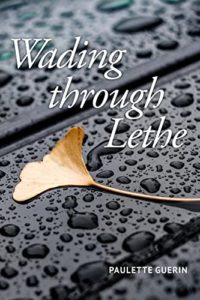Paulette Guerin Remembers What Has Shaped Her Life
In Greek mythology, five rivers flowed through Hades, the underworld. The River Styx was the boundary between Earth and Hades. Phlegethon was the river of fire. Cocytus was the river of lamentation. Acheron was the river of sorrow. And the river forming the boundary with Elysium was Lethe, the river of forgetfulness, which flowed through the cave of Hypnos, the god of sleep. To drink of the River Lethe was to experience forgetfulness, perhaps the final step toward death.
Poet Paulette Guerin doesn’t want to forget. She uses the Greek myth in her new collection, Wading through Lethe, to remember her family, her childhood, visits to relatives, the hurricane party in her college dorm, travels to Europe as an exchange student and vacations in the U.S., and even cleaning out the attic. She wades through the River Lethe but doesn’t drink of its forgetfulness. She may be stirring its waters, but she’s consciously doing so to not forget the experiences and people that have shaped and life and herself.
The collection’s 62 poems are divided into three sections. The first section contains poems about childhood, growing up, and family. The second section holds poems about college and her experiences in Europe, including a long poem about Rome. The third section includes the poems about home and family, seen from the vantage point of adulthood. Guerin’s organization of the poems seems to suggest that her experiences in Europe were the pivotal point in her life.
All of the poems are what I would call “quiet” poetry — thoughtful, carefully thought out, and simply stated. The effect is not nostalgic or sentimental but more fully appreciative of the people and events she’s experienced. She recognizes, as she says in one poem, “You can never go home again, but if you do,” you may well discover what has shaped you, like members of your family.
Cyclist with Two Bikes

the handlebars of another bike.
It’s as if a ghost rides carefully beside her.
They are too close to make balance easy,
and I remember after her death
wanting to feel that closeness, however precarious,
while bagging embroidered handkerchiefs
against moth, dust. Years later, I was surprised
by how they had kept
her smell. I had already learned to let go,
not expecting the grip of bergamot, of cloves.
—Paulette Guerin

Paulette Guerin
Guerin has previously published a chapbook, Polishing Silver; Wading through Lethe is her first full collection. Her poems have been published in a number of anthologies, journals, and literary magazines, including Best New Poets 2018, Green Briar Review, Elder Mountain, Cantos, Concho River Review, Summerset Review, Timberline Review, Glassworks, The Main Street Rag, Euphony Journal, and Stonecast Review, among others. She lives and teaches in Arkansas.
Wading through Lethe uses memory to recognize the important and consequential in a life, as it underscores how the small things can make the difference. These poems by Guerin prompt a taking stock, evoking similar memories in the reader’s life and reminding us of what we have to be grateful for.
Photo by Bureau of Land Management, Creative Commons, via Flickr. Post by Glynn Young.
How to Read a Poem uses images like the mouse, the hive, the switch (from the Billy Collins poem)—to guide readers into new ways of understanding poems. Anthology included.
“I require all our incoming poetry students—in the MFA I direct—to buy and read this book.”
—Jeanetta Calhoun Mish
- Poets and Poems: Avraham Stern and “A Soldier and a Poet” - July 15, 2025
- Poets and Poems: Beth Copeland and “I Ask the Mountain to Heal My Heart” - July 10, 2025
- A.E. Stallings: the Parthenon Marbles, Poets, and Artists - July 8, 2025


Paulette Guerin says
Thank you for such a lovely review! I really appreciate it. And thank you for seeing what I was hoping would come through in the collection.